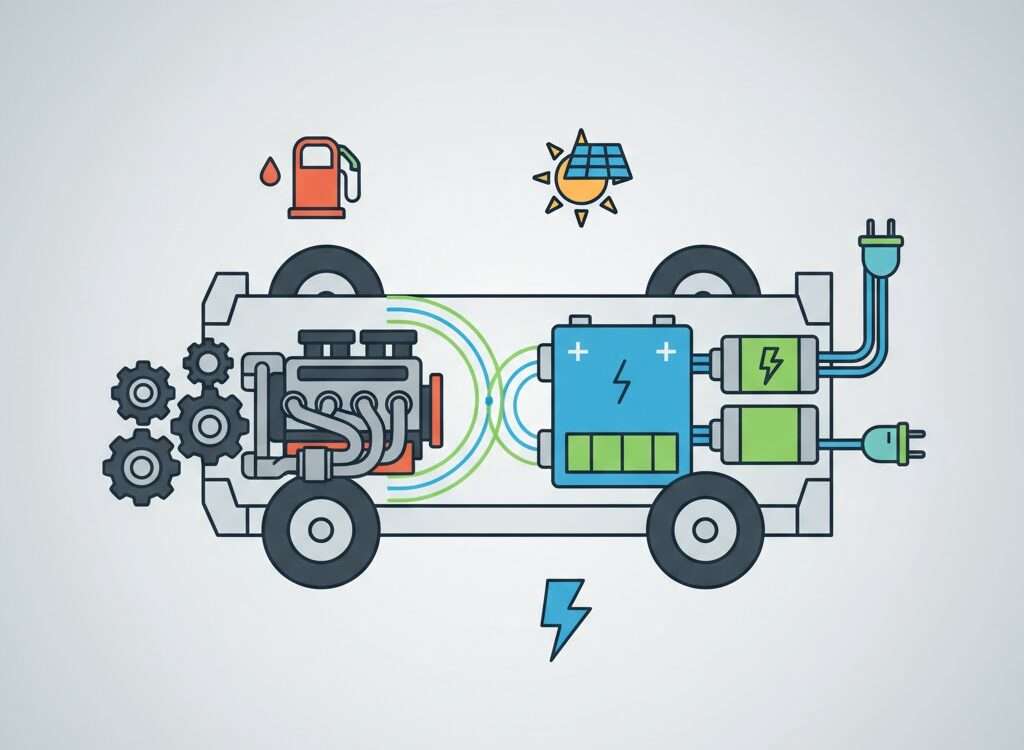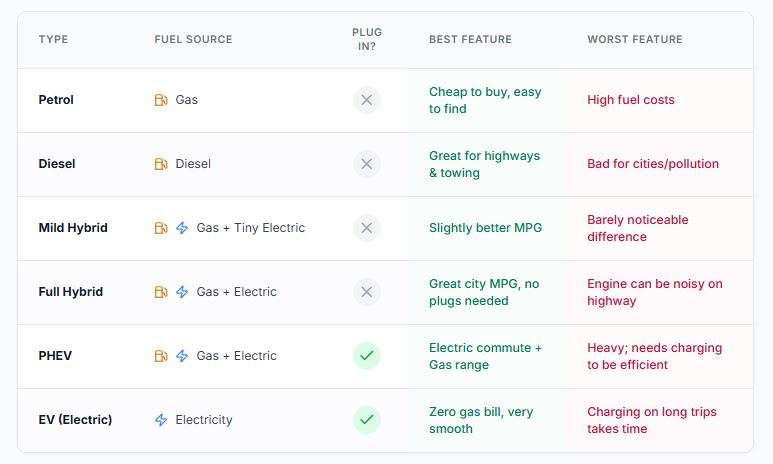- 19 November 2025
- No Comment
- 180
Which Car Type Actually Saves You Money? A Beginner’s Guide

Every Type of Car Explained for First-Time Buyers
Congratulations! Buying your first car is a massive milestone. It’s exciting, but let’s be honest, it can also be incredibly confusing.
Walk into a dealership today, and you aren’t just asked about color or brand. You’re hit with an alphabet soup of acronyms: ICE, HEV, PHEV, BEV, FCEV. It sounds more like a science exam than a shopping trip.
Don’t worry. We are going to strip away the jargon and look at what these cars actually do, how they fit into your life, and which one might be the perfect partner for your first set of keys.
1. The Old Guard: Internal Combustion Engines (ICE)
These are the cars most of us grew up with. They run on fossil fuels, make a “vroom” sound, and you fill them up at a gas station.
A. Petrol (Gasoline) Cars
The default choice for decades. You put petrol in, a spark plug ignites it, and the mini-explosions move the wheels.
- Best For: City drivers, people who want a lower upfront cost, and those who don’t drive huge distances annually.
- Pros:
- Cheaper to Buy: Generally the most affordable option to purchase new or used.
- Convenience: Gas stations are everywhere. Refueling takes 5 minutes.
- Fun Factor: Petrol engines are often lighter and peppier (more responsive) than diesel.
- Cons:
- Fuel Costs: Petrol is expensive to burn, especially in stop-start city traffic.
- High Taxes/Emissions: Many cities are charging extra for older petrol cars due to pollution.
- Resale Value: May drop faster as the world moves toward electric.
B. Diesel Cars
Once the king of the highway, diesel uses compression (squeezing air) rather than spark plugs to ignite fuel.
- Best For: High-mileage drivers, highway commuters, and people towing trailers or caravans.
- Pros:
- Fuel Efficiency: You get significantly more miles per gallon (MPG) than petrol, especially on highways.
- Torque (Pulling Power): Great for overtaking and carrying heavy loads.
- Longevity: Diesel engines are famously tough and can last for very high mileages.
- Cons:
- Pollution: They produce more particulates (soot) and NOx gases. Many cities are banning or heavily taxing diesels.
- Maintenance: Modern diesels have complex filters (DPF) that will clog up if you only do short city trips. Do not buy a diesel if you only drive to the grocery store 2 miles away.
- Noise: Usually louder and “clatterier” than petrol cars.
2. The Hybrids: The “Best of Both Worlds”
Hybrids use two power sources: a fuel engine (petrol/diesel) and an electric motor. They are designed to save fuel without the “range anxiety” of a full electric car.
A. Mild Hybrid (MHEV)
The “Diet” Hybrid. These cars have a tiny electric motor that helps the engine but cannot drive the car on electricity alone. It just helps the engine start smoothly and turn off when you are stopped at a red light.
- Verdict: A small fuel saving (10-15%) over standard petrol cars. Good, but not a game-changer.
B. Full Hybrid (HEV)
The “Classic” Hybrid (Think Toyota Prius). These are “self-charging.” You never plug them in. The car charges its own small battery by capturing energy when you brake or by using the petrol engine as a generator.
- Best For: Urban drivers who want to save money but live in apartments/houses where they cannot plug in a car.
- Pros:
- Stress-Free: Drive it exactly like a petrol car. No plugs, no cables.
- City Efficiency: In traffic jams, the engine turns off and you creep forward on electricity. Huge fuel savings in the city.
- Cons:
- Highway Struggle: On the open road, the heavy battery is dead weight, and the petrol engine does all the work, sometimes making it less efficient than a regular diesel.
C. Plug-in Hybrid (PHEV)
The “Halfway House”. This car has a bigger battery and a plug socket. You charge it at home, and it can drive 30–50 miles (50–80 km) on pure electricity. When the battery dies, the petrol engine wakes up and it acts like a normal hybrid.
- Best For: Commuters with a driveway. You drive to work on cheap electricity, but you still have a gas tank for that weekend road trip.
- Pros:
- Cheap Commutes: If your daily drive is short, you might not use a drop of petrol for weeks.
- Flexibility: No range anxiety. If you run out of battery, you just keep driving on gas.
- Cons:
- The “Lazy Tax”: If you don’t charge it, you are just driving a very heavy petrol car with bad fuel economy. You must plug it in to make it worth the money.
3. The Future: Electric & Beyond
These cars have ditched the engine entirely. No exhaust pipe, no smoke.
A. Battery Electric Vehicle (BEV / EV)
The Pure Electric. A giant battery in the floor and electric motors on the wheels. That’s it.
- Best For: Homeowners with driveways (for charging), tech-lovers, and eco-conscious buyers.
- Pros:
- Running Costs: Electricity is much cheaper than petrol.
- Maintenance: No oil changes, no spark plugs, no exhaust to rust. Very little goes wrong mechanically.
- Performance: Instant speed. They are quiet, smooth, and often very fast.
- Cons:
- Range Anxiety: You have to plan long trips around charging stations.
- Charging Time: Filling gas takes 5 minutes; charging an EV on the highway takes 20–40 minutes.
- Upfront Cost: They are still more expensive to buy than petrol cars (though they save you money over time).
B. Hydrogen Fuel Cell (FCEV)
The “Science Fiction” Option. These are electric cars, but instead of a battery you plug into the wall, they have a tank you fill with hydrogen gas. The car turns the hydrogen into electricity on the fly.
- Pros: Refuels in 5 minutes like a gas car, but emits only pure water.
- Cons: Virtually impossible to buy or fuel right now. Hydrogen stations are extremely rare. Not recommended for a first-time buyer yet.
C. Solar Cars
The Emerging Tech. These are EVs covered in solar panels to trickle-charge the battery while parked or driving.
- Status: Currently, these are mostly prototypes or very expensive niche vehicles. While exciting, they aren’t a practical mass-market option for a first-time buyer in 2024/2025.
Which One Should You Buy?
As a first-time buyer, ask yourself these three questions:
- Where do I live?
- Apartment/Street parking? Avoid Plug-in Hybrids and EVs. Stick to Petrol or Full Hybrid (HEV).
- House with driveway? EV or PHEV becomes a great option.
- How do I drive?
- Mostly city/school runs? Full Hybrid or EV is king.
- Mostly highway/long distances? Diesel is still the champion of the highway.
- What is my budget?
- Strict budget? Used Petrol cars are the cheapest entry point.
- Higher budget but want low monthly bills? EVs cost more to buy but pennies to run.
Quick Cheat Sheet: Petrol vs Diesel vs Hybrid vs Electric, HEV vs PHEV vs BEV

My Advice for a First-Timer: If you are nervous about charging and range anxiety, start with a Full Hybrid (HEV). It gives you the fuel savings of modern technology without requiring you to change your lifestyle or install a charger at home. It is the safest stepping stone into the future.
